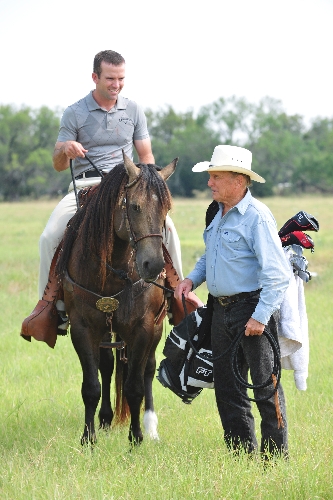‘Seven Days in Utopia’ too comfortable, predictable
If only "Seven Days in Utopia" were as idyllic as its title setting.
We've all been there, of course -- if only in the movies.
From "It's a Wonderful Life's" Bedford Falls to "Cars' " Radiator Springs, cinematic small towns hold life-altering answers for all sorts of stressed-out Type-A types who need to breathe deeply, smell the roses (or other handy local flora) and reorder their priorities.
Utopia, Texas, turns out to be exactly that sort of place.
No surprise there -- or anywhere else in "Seven Days in Utopia."
This genial little fable ranks as the cinematic equivalent of comfort food: easy to digest and blandly satisfying, but not nearly as good for you as it ought to be, despite its earnest interest in providing hearty food for thought.
Fortunately, that sly old master Robert Duvall is the one doing most of the spinning when it comes to the movie's homespun homilies.
It's the kind of role Duvall could play while sleepwalking, but -- to his credit -- he's as alert as ever, bringing a touch of flinty intensity to the otherwise predictable proceedings.
Before we meet Duvall's character (and we do mean character), however, we must make the acquaintance of Luke Chisolm ("Friday Night Lights' " Lucas Black, who co-starred with Duvall in last year's delightful "Get Low").
Luke's a young Texas golfer with a bright 'n' shiny professional future -- at least according to his relentlessly hard-driving father ("Justified's" Joseph Lyle Taylor), who's caddying when Luke suffers a very public meltdown at his first major tournament.
Enraged, the young golfer hits the road to nowhere -- or, as it turns out, Utopia, a tiny Texas town where he conveniently crashes his car.
Riding to the rescue: Duvall's Johnny Crawford, a former pro golfer who invites Luke to stick around for a week to work on his game -- and develop a new approach to the game of life that's more about playing and less about winning.
Inevitably, there are other incentives to stick around, from the bucolic setting (the scenic Texas hill country west of Austin, as well as the real Utopia's location west of San Antonio) to Sarah ("True Blood's" true-blue Deborah Ann Woll ), the winsome waitress down at the down-home cafe run by her widowed mother ("The Fighter" Oscar winner Melissa Leo, in a frustratingly abbreviated role).
Also inevitably, Luke encounters a few folks less than thrilled by his extended presence -- particularly a local cowboy ("The Hurt Locker's" Brian Geraghty ) who's sweet on Sarah.
But Utopia being Utopia, there's no danger of any real danger, just a few mild scuffles to provide a show of contrived conflict while Johnny imparts his hard-won wisdom to his eager pupil.
Based on David L. Cook's novel, "Golf's Sacred Journey: Seven Days at the Links of Utopia," this adaptation (scripted by Cook, Rob Levine, "Letters to God's" Sandra Thrift and director Matthew Dean Russell) is as connect-the-dots as they come, treating every potential complexity -- from Luke's tense relationship with his father to Johnny's past demons -- in the same mild-mannered fashion.
As if to compensate for the script's country-comfort predictability, director Russell (a visual effects veteran making his directorial debut) piles on the colorful travel-brochure elements -- fly-fishing, the local rodeo, even an aerial perspective -- as we follow Luke's life-changing week.
Ambling at best, plodding at worst, "Seven Days in Utopia" takes its own sweet time as it counts down the days to Luke's chance for redemption at a big-deal PGA tournament. There, he can show everything he's learned -- and maybe, in the process, prove he belongs there after all.
It's all never less than pleasant, especially with Duvall and Black bantering away.
But it's never more than that, either -- except for a brief break from the down-home hokum, when Johnny and Leo's underwritten character sit a spell to recall departed loved ones.
Watching these superbly expressive actors wordlessly conjure bittersweet emotion makes you wish "Seven Days in Utopia" had a script worthy of their talents.
Darn it all, they don't. So I guess we'd best be grateful for even a fleeting glimpse of the depths "Seven Days in Utopia" might have attained -- if it weren't so determined to stay so safe, and so comfortably on the surface.
Contact movie critic Carol Cling at ccling@reviewjournal.com or 702-383-0272.
Review
"Seven Days in Utopia"
99 minutes
G; all ages
Grade: C+
at multiple locations
Deja View
When it comes to sports-movie classics, golf's not quite in baseball's league, but these titles provide some definite drive:
"Pat and Mike" (1952) -- The legendary team of Spencer Tracy and Katharine Hepburn reunites for this tale of a women's sports sensation -- and the slightly shady promoter she enlists as her manager.
"The Caddy" (1953) -- Then-partners Dean Martin and Jerry Lewis enliven this comedy about a gifted golfer (Lewis) who's too nervous to play in public, serving as caddy and coach to his pal (Martin) instead.
"Tin Cup" (1996) -- The all-star "Bull Durham" team of Kevin Costner and writer-director Ron Shelton reunites for this romantic comedy about a washed-up golf pro, working at a driving range, who sets out to qualify for the U.S. Open -- and win over the girlfriend (Rene Russo) of his successful rival (Don Johnson).
"The Legend of Bagger Vance" (2000) -- The mystical title caddy (Will Smith) helps a disillusioned down-and-out golfer (Matt Damon) revive his game, and his life, in director Robert Redford's Depression-set drama.
"The Greatest Game Ever Played" (2005) -- At the 1913 U.S. Open, young, working-class amateur Francis Ouimet (Shia LaBeouf) gets the chance to play -- and winds up challenging his idol, British champion Harry Vardon (Stephen Dillane) in this fact-based drama.
-- By CAROL CLING






















